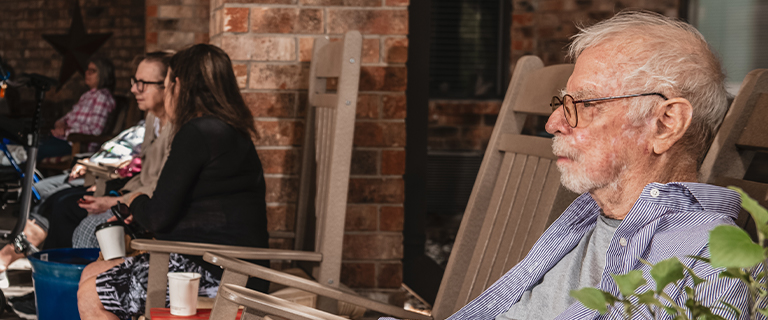Finding Your Balance
Good balance is more than the ability to stand on one foot or perform cartwheels on a balance beam. Balance means having control over your body and describes steadiness or stability, whether standing or sitting.
Maintaining balance as you age is crucial for supporting your health and lifestyle, whether you live independently or need supportive services. Losing your balance can be a frightening experience, especially when it happens frequently.
Although balance disorders are more common in older adults, there are options for managing balance issues.
What are Balance Issues?
Balance issues can take multiple forms in older adults, depending on the cause. Everyday tasks can become more challenging with a balance disorder. Seniors might stagger when they walk or struggle to stand up. Common balance symptoms include:
- Blurred vision
- Confusion or disorientation
- Dizziness or vertigo (spinning sensation)
- Falling (or feeling likely to fall)
- A floating sensation
- Lightheadedness or faintness
- Nausea or vomiting
Seniors may experience a combination of short-term and long-term symptoms. In the short term, seniors may have feelings of anxiety, fear, or panic. Balance issues may be accompanied by sudden changes in heart rate or blood pressure. Long-term balance problems increase the risk of injuries and can lead to depression or fatigue.

Causes of Balance Issues
Balance issues are a common reason seniors seek medical assistance. Although aging can increase the risk of developing balance issues, aging is not the cause. Instead, health factors related to aging, such as chronic illnesses, circulatory system diseases, inner ear problems, and medications, are common causes.
Blood Pressure Changes
Many people have experienced lightheadedness from standing up too quickly or felt dizzy after skipping a meal. Blood pressure is often the cause.
Maintaining healthy blood pressure is crucial for multiple aspects of health. When blood pressure is too high or too low, it increases the risk of health problems, including balance disorders.
Orthostatic hypotension (or postural hypotension) is common in older adults. The condition is a form of sudden low blood pressure when seniors try to stand up after sitting or lying down. Orthostatic hypotension can cause dizziness, fainting, or lightheadedness.
Multiple factors can cause blood pressure issues. Common risk factors that link blood pressure and balance problems include dehydration, heart health issues, nervous system disorders, and prolonged bed rest.
Seniors can manage blood pressure problems with lifestyle changes, medication, and recommendations from their healthcare team. Your doctors and therapists can offer personalized treatment and advice, but, generally:
- Seniors can reduce high blood pressure risks by practicing regular exercises, enjoying a healthy diet, reducing salt intake, and maintaining a healthy weight.
- Seniors can manage low blood pressure symptoms by avoiding alcohol, drinking more fluids, and standing more slowly.
Chronic Health Problems
Chronic health conditions describe long-term health issues, typically developing slowly and worsening over months or years. For example, chronic problems that increase the risk of falls and balance issues include arthritis, diabetes, heart disease, multiple sclerosis, nerve abnormalities, and vision problems.
Neurological conditions also commonly cause balance problems. Alzheimer’s or Parkinson’s disease can cause movement and coordination issues as the disease progresses. Other brain health issues can also impact balance, from migraines to head injuries.
Many treatments and management options are available to help control symptoms of chronic health problems. Seniors may benefit from a combination of physical therapy and medications.
Vestibular Disorders
The vestibular system is a sensory system with structures located in the inner ear. The system gathers spatial orientation, motion, and position information to inform our balance, posture, and movement. Inner ear problems, including infections or injuries, can impact the vestibular system’s functions and disrupt equilibrium.
Many exercises focus on strengthening muscles to support balance, but your ear health is also crucial for balance. Seniors can treat vestibular balance disorders with lifestyle changes, medications, surgery, or therapy.
Benefits of Balance Exercises
Seniors may need to treat their balance issues with multiple methods depending on the underlying cause. But, practicing balance exercises should be a part of every care plan, even for seniors with few or mild symptoms.
Balance exercises are crucial for supporting an active lifestyle. The Centers for Disease Control and Prevention (CDC) recommends seniors have at least:
- 3 days a week of balance-enhancing activities
- 2 days a week of muscles-strengthening activities
- 150 minutes a week of moderate-intensity activities
Improving balance helps seniors have the confidence to move independently. Enhancing balance reduces the risk of falls or injuries. Balance exercises support and develop physical skills, including:
- Coordination
- Flexibility
- Muscle strength
- Stability
Support for a Balanced Life
Maintaining or improving balance can be more challenging for older adults, often because of chronic health issues or a lack of resources. Seniors communities provide older adults with the support and services they need to live healthy, balanced lifestyles.At Parsons House Austin, we craft dynamic, flexible care plans for our residents. We offer multiple lifestyle options, so seniors can feel at home while receiving the care they need. Please contact us or schedule a tour to learn about our well-respected community!



